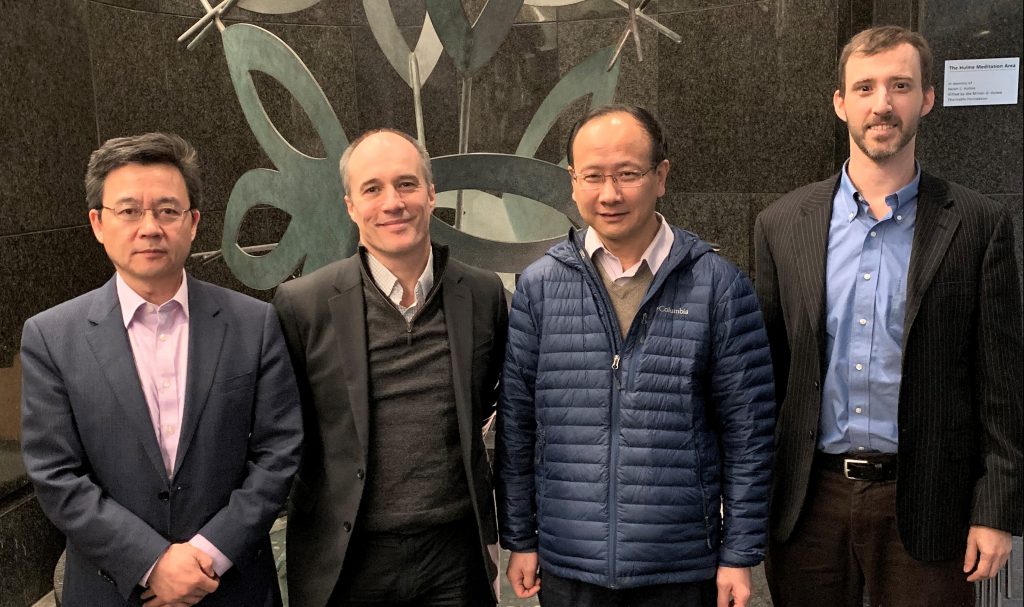Sam Rothstein is feeling good about his decision four years ago to take the helm of Duo Oncology, a startup company initially funded by Pitt faculty/clinician oncologists excited about the nanomedicines emerging from the research of their colleague, Song Li.
Dr. Li is a professor of pharmaceutical science and director of the Center for Pharmacogenetics at the University of Pittsburgh School of Pharmacy. He has shown in mouse models of pancreatic cancer that a nanoparticle polymer created in his lab can penetrate the stroma, a dense matrix of collagen and other tissue that envelopes pancreatic cancer tumors, to deliver chemotherapy drugs more effectively than the current standard treatment.

In 2023, the company announced a $3 million seed investment round led by the venture capital firm SeedFolio, with other participants including LifeX, the Pitt-established life sciences capital growth company, and Innovation Works, a state-funded early-stage technology investment organization.
The company recently concluded a series of successful animal studies on the safety and efficacy of its lead compound. Rothstein is now raising the approximately $7 million needed to produce the nanomedicine for cancer patients and begin a clinical trial in Australia later this year.

“We’re raising an investment right now to pay for the Phase 1 trial and have a term sheet and a lead investor. We are approaching other investors to keep moving toward the clinic,” Rothstein said.
Rothstein said Australia was chosen for the initial trials because it has a robust clinical trial infrastructure, streamlined approvals, and research and development tax credits that refund more than 40 percent of the trial costs.
“We’re doing something really unique. There are other companies developing nanomedicines, but none of those have the uniquely small-size profile that Duo’s platform has. It is beautiful chemistry,” Rothstein said.
Rothstein earned his PhD in chemical engineering from Pitt under the tutelage of prolific Pitt innovator and Fellow of the National Academy of Inventors, Steve Little. He previously the co-founded another Pitt startup, Qrono Inc.
The nanomedicine in Duo’s lead product delivers both gemcitabine, which interferes with DNA synthesis, and paclitaxel, which disrupts the cell division process. The patent licensed from Pitt on the technology was issued last fall.
The trial will take approximately two years with 80 patients separated into two 40-person groups. Cancer types for the trial have been selected by practicing oncologists and include bile duct, lung, and breast cancer, in addition to pancreatic cancer.
In parallel with the trial in Australia, Duo Oncology will utilize the FDA’s 505(b)(2) pathway, which Rothstein said carries a reduced regulatory burden. The company has also received an Orphan drug designation for pancreatic cancer from the FDA, which grants market exclusivity and reduced regulatory fees. This indication is also eligible for Fast Track and Breakthrough Therapy designations with the FDA, which also expedites review if preliminary evidence indicates the drug may offer substantial improvement over existing therapies.
If the trial meets its milestones, Rothstein said the company will apply to begin Phase 2 trials, which would require raising an additional roughly $18 million to complete.
In addition to its lead compound, the company is working on another therapy with slightly different payloads that act by directly attacking tumors as well as by stimulating the body’s anti-tumor immune response. This compound has been supported by a federal Small Business Technology Transfer (STTR) grant from the National Cancer Institute.
Duo Oncology’s other co-founders are Stephen Thorne, a former Pitt faculty member who left the university after licensing his research and forming what is now Kalivir Therapeutics; and UPMC oncologist Jing-Zhou Hou. They were joined by Stanley Marks, Chairman of the Hillman Cancer Center and clinical professor of medicine at Pitt’s School of Medicine, in providing the initial funding for the company.
The Office of Innovation and Entrepreneurship provides the education, mentorship, and funding to help Pitt innovators navigate their commercialization pathways to achieve societal impact for their research. Whether you’re taking your first steps or are ready to launch a startup, our team is here to support you at every step.
Check out our programs page to learn more about our offerings or email us at OIEHelp@pitt.edu to connect with our experienced staff.